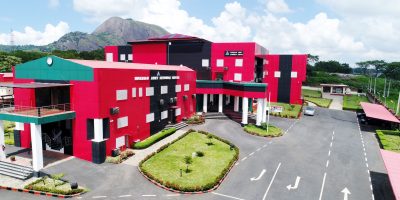Nigerian Army Resource Centre (NARC) Weekly Subject Experts’ Presentation was held at Hall E, ML Agwai Block, Abuja. There were three presentations made by the Subject Experts on China, South Africa and Middle East, North Africa and Turkey.
The first presentation by Maj Gen JA Orokpo (Rtd) subject experts on China, Centered his presentation on how Guangdon Highway Collapses Killing Dozens of People. The British Broadcasting Corporation (BBC) reported on 30 Apr 24 that 24 people have died after a section of a mountainside highway collapsed in China’s Guangdong province, followings days of heavy rain. Thirty others were taken to hospital after a 17.9m (58ft) stretch of the Meilong expressway crumbled at 02:10 hrs local time. The Chinese State media report had stated that the 30 people in hospital are ‘not currently at risk’. The provincial government has dispatched 500 emergency response personnel to the scene. Footage that appeared to have been taken shortly after the collapse showed flames and black smoke billowing from below the highway. A total of 20 vehicles fell in the collapsed portion of the road.
In his analysis and lessons for Nigeria, Maj Gen JA Orokpo (Rtd) noted that, In Nigeria, there have been several instances of highway collapse due to flooding. The Tribune Newspapers reported on 14 Aug 23 that the bridge along Gombe-Bauchi Federal Highway at Bara village has been collapsing repeatedly every rainy season, disrupting movements between the 2 states. Travellers have had to re-route through alternative dilapidated roads and also the Benin – Ore road is a major interstate highway that connects the southern states of Nigeria. The road is prone to regular flooding, which has led to severe disruptions in vehicular traffic and commercial activities.
He recommended that, the FGN through the Federal Ministry of Works to ensure that drainage systems on the highways are expanded to remove excess water from the roads and also invest in robust flood prevention infrastructure like embankments on flood-prone areas of the highways.
Equally the second presentation by Col OR Akerele (Rtd) Subject experts on South Africa, focused his presentation on how small Power Producers of Renewable Energy Add 30mw to the National Grid. In Dar Es Salaam, Tanzania, the Rural Energy Agency (REA) reported that small power producers and developers in the country have generated and contributed over 30MW to the national grid. This was revealed by the Director REA Advera Mwijage during a meeting on Thursday 9 May 24, at a meeting to guide small power developers of renewable energy project on how to apply for subsidies for investments and development of their projects. She said “the government, through the World Bank has provided 30bn Shillings to provide subsidies to small developers to conduct research on electricity generation projects and supply power to residents and also sell to national grid especially to be used for areas where energy remains insufficient or has not reached”.
In his analysis and lessons for Nigeria, Col OR Akerele stressed that, specifically, they are expected to produce and contribute 10MW in Dec 24 alone. These efforts are meant to augment the fossil fuel currently in use and to invigorate small and medium enterprises and their cottage industries in Tanzania. Nigeria is a blessed country with both clean and unclean energy resources. Amidst its abundance, the government is unable to provide a steady power supply. This presentation therefore looks at the need to boost renewable energy production in Nigeria. It also brings out some lessons which Nigeria could learn from Tanzania and the implications of such initiatives on Nigeria’s national security.
He recommended that, the Federal Government of Nigeria and state governments should continue to collaborate with local and international bodies and agencies such as the World Bank and African Development Bank for the development of renewable energy and also review the country’s economic policies linked to Renewable Energy Development in order to argument electricity supply from the National Grid.
While the third presentation by Brig Gen SO Oloyede Subject experts on Middle East, North Africa and Turkey focused his presentation on Exercise African Lion 2024. On 30 April 2024, the seventh consecutive year of African Lion exercises in Tunisia commenced with an opening ceremony at El Aouina Air Base in Tunis, on 29 April 2024 (Legros, 2024). Similarly, on 11 May 2024, Morocco World News (2024) Reported that Morocco and the US are also set to conduct a joint military drill from 20 – 30 May 2024. The drill is the same US driven exercise nicknamed EXERCISE AFRICAN LION 2024, which was flagged off in Tunisia three weeks earlier.
In his analysis and lessons for Nigeria, Brig Gen SO Oloyede pointed that, Nigeria, with the most thriving social elements of national power has a long history of military partnership with the US, in a relationship where Nigeria benefits from US’ controlled support, with conditions, as the US dictates how its support is utilised. Considering the fact that Nigeria’s indigenous military technology is still at infancy, total dependence on the US for military capacity could be counterproductive if national interests between the two countries are at variance in the future.
He recommended that, the Federal Government of Nigeria should re-examine the principle of deterrence in her defence policy, with a view to designing and adopting a less costly, yet effective approach to national security and also seize the opportunity offered by Exercise AFRICAN LION to enhance its military operational skills against contemporary challenges hindering its national security.

























